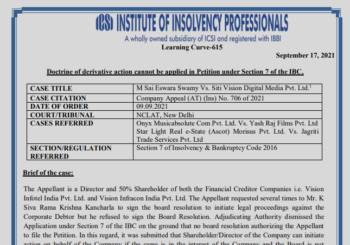Can LLPs Partner with Individuals? - A Detailed Analysis of Kerala HC Ruling
May 14, 2021
Kerala High Court has in Jayamma Xavier vs. Registrar of Firms ruled that a Limited Liability Partnership (‘LLP’) cannot have a disqualification from entering into a partnership with individual or other persons. This comes from the difference in provisions of the Indian Partnership Act, 1932 and The Limited Liability Partnership Act, 2008 related to liability of the partners. The Kerala HC has observed that “…the difference in the provisions under the Partnership Act relating to liability of the firm or the individual partners would not stand in the way of constitution of a partnership with an LLP”.
In the instant case the Registrar of Firms,Vanchiyoor, Thiruvananthapuram had declined the registration of the partnership firm constituted by Ms. Jayamma Xavier, stating that an LLP cannot be a partner of a firm. Ms. Jayamma Xavier then challenged this order by way of a Writ Petition in the Kerala HC. Ms. Jayamma Xavier claimed to be the designated partner of Sleeplock LLP registered under The Limited Liability Partnership Act, 2008 (‘LLP Act’). The Sleeplock LLP formed a partnership firm along with one Mr. Gourav Raj in the name and style of M/s. Morning Owl Sleep Solutions. Accordingly, a partnership deed was executed on 18.09.2020. The said deed was submitted for registration before the Registrar of Firms,Vanchiyoor, Thiruvananthapuram. The Registrar rejected the application stating that an LLP cannot be a partner of a firm.
It is pertinent to note here that a partnership along with an LLP is not prohibited under the Indian Partnership Act, 1932 (‘the Partnership Act”). As per Section 3 of the LLP Act, an LLP is a body corporate, formed and incorporated under the Act. It is a legal entity separate from its partners. It has a perpetual succession. Further under Section 14 of the LLP Act it is capable of suing and being sued, on its registration. It is also capable of acquiring, developing or disposing of movable or immovable properties. Therefore, in the writ petition it was claimed that the LLP is liable to be treated as a person and hence there cannot be any objection for registering a partnership with an LLP which is a person.
Kerala HC relied upon the judgment in M. M. Pulimood vs. Registrar of Firm [1984 KLT 420] and stated that “…the rejection in registering the firm is illegal and without understanding the provisions contained in the LLP Act.”.
Kerala HC also relied upon the judgment in Dulichand Laxminarayanan vs. Commissioner of Income Tax, Nagpur [AIR 1956 SC 354]. However, it stated that when both these judgments were given, the LLP Act had not come into force. It was therefore important to breakdown the relevant definitions under the Partnership Act and the LLP Act. Under the Partnership Act, “Partnership” is defined as the relation between persons who have agreed to share the profit of a business carried on by all or any of them acting for all.
Persons who have entered into partnership with one another are called individually “partners” and collectively “a firm” and the name under which their business is carried on is called the “firm name”. However, “person” is not defined either in the LLP Act or the Partnership Act. Section 3(42) of the General Clauses Act, 1897 defines “person” as – “person” shall include any company or association or body of individuals, whether incorporated or not.
The definition of body corporate, LLP and LLP agreement are given under clause (d), (n) and (o) of Section 2 of the LLP Act as follows:
(d) “body corporate” means a company as defined in Section 3 of the Companies Act, 1956 (1 of 1956) and includes—
- a limited liability partnership registered under this Act;
- a limited liability partnership incorporated outside India; and
- a company incorporated outside India,
but does not include—
- a corporation sole;
- a co-operative society registered under any law for the time being in force; and
- any other body corporate (not being a company as defined in Section 3 of the Companies Act, 1956 or a limited liability partnership as defined in this Act), which the Central Government may, by notification in the Official Gazette, specify in this behalf;
(n) “limited liability partnership” means a partnership formed and registered under this Act;
(o) “limited liability partnership agreement” means any written agreement between the partners of the limited liability partnership or between the limited liability partnership and its partners which determines the mutual rights and duties of the partners and their rights and duties in relation to that limited liability partnership;
An LLP shall be a body corporate, as per Section 3 which reads as follows:
3. Limited liability partnership to be body corporate —
- the partner in fact has no authority to act for the limited liability partnership in doing a particular act; and
- the person knows that he has no authority or does not know or believe him to be a partner of the limited liability partnership.
Extent of liability of a partner in an LLP is given under Section 28 as follows:
28. Extent of liability of partner —
- A partner is not personally liable, directly or indirectly for an obligation referred to in sub-section (3) of Section 27 solely by reason of being a partner of the limited liability partnership.
- The provisions of sub-section (3) of Section 27 and sub-section (1) of this section shall not affect the personal liability of a partner for his own wrongful act or omission, but a partner shall not be personally liable for the wrongful act or omission of any other partner of the limited liability partnership.
Now it is necessary to have a look at the provisions contained in Section 25, 26 and 45 of the Partnership Act which read as follows:
25. Liability of a partner for acts of the firm —
Every partner is liable, jointly with all the other partners and also severally, for all acts of the firm done while he is a partner.
26. Liability of the firm for wrongful acts of a partner —
Where, by the wrongful act or omission of a partner acting in the ordinary course of the business of a firm, or with the authority of his partners, loss or injury is caused to any third party, or any penalty is incurred, the firm is liable therefore to the same extent as the partner.
45. Liability for acts of partner done after dissolution —
- Notwithstanding the dissolution of a firm, the partners continue to be liable as such to third parties for any act done by any of them which would have been an act of the firm if done before the dissolution, until public notice is given of the dissolution:
Provided that the estate of a partner who dies, or who is adjudicated an insolvent, or of a partner who not having been known to the person dealing with the firm to be a partner, retires from the firm, is not liable under this section for acts done after the date on which he ceases to be a partner.
- Notices under sub-section (1) may be given by any partner. –
The liability of partners of LLP and liability of the LLP as a partner under the Partnership Act would be different. The liability of partners in an LLP cannot have any relevance when the LLP itself becomes a partner, when it would be bound by the provisions in the Partnership Act.
The liability of the LLP would be as in the case a company which joins a firm after entering into a partnership.
Section 4 of the Partnership Act permits Constitution of a firm or partnership between one or more persons. In this case, the partnership deed was executed between an individual and an LLP which is a body corporate having a legal entity and coming within the definition of “person”. The individual liability of the partners of LLP would not be relevant when the LLP itself would have liability independent of the liability of the partners. Therefore, the difference in the provisions under the Partnership Act relating to liability of the firm or the individual partners would not stand in the way of constitution of a partnership with an LLP. The judgment in M. M. Pulimood vs. Registrar of Firm [1984 KLT 420] where a Private Company was held entitled to be a partner was applied in the present case though the LLP is not a private company but is a legal entity.
“The individual liability of the partners of LLP would not be relevant when the LLP itself would have liability independent of the liability of the partners. Therefore, the difference in the provisions under the Partnership Act relating to the liability of the firm or the individual partners would not stand in the way of the constitution of a partnership with an LLP,” remarked Kerala High Court in its order. The High Court allowed the Writ Petition and also directed the Registrar to reconsider the request of Ms. Jayamma Xavier for registration.
The approach taken by the Kerala HC seems to be a logical step in opening the avenues for registration of firms with persons other than individuals as partners. The underlying issue was that of the limited liability the partners have in case of an LLP. Would that be passed on to the LLP when it becomes a partner in a firm? The Kerala High Court has denied this in its judgment the reason being the limited liability is triggered in case of liability within the partners of the firm and not when LLP is a partner of the firm. Therefore, an LLP cannot have a disqualification from entering into a partnership with individual or other persons.
Disclaimer
All academic material provided in this website by way of quiz or otherwise is derived from various sources, reference of which is given below. The objective is to provide such information or exercises is purely for academic purpose. MPPL is not the creator of such information since they are derived from the statutes, laws, rules, regulations, notifications or circulars issued by the government authorities or judgments of courts of law under relevant laws. While MPPL is only collating such information, it does not claim any exclusive copyright thereon except the manner in which it is being presented. The user understands that some situational questions can have different views and opinions which may not necessarily match with what the answer keys provide. MPPL does not vouch for or guarantee the accuracy or dependability of the answer key. Nor shall it be liable for any suits, prosecution, proceedings, actions, damages based on the academic information provided here. The responsibility to cross-check and verify the veracity of the information provided here rests upon the user and visitor of the website.
MPPL has taken all reasonable precautions for not violating anyone else’s copyright or intellectual property right and believes. However, in case someone still feels that any of the content provided here was subject to their copyright, such person is requested to get in touch with MPPL on its email id a pratima@mangalamjobs.com and necessary remedial measures can be undertaken without prejudice to MPPL.


